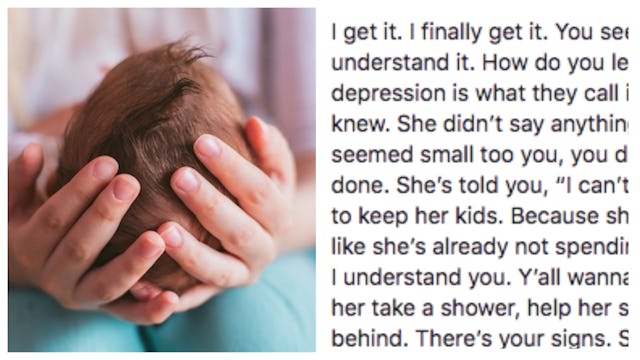'She Told You': Mom's Powerful Post About Signs Of PPD Goes Viral

This viral post will get you to stop and think about whether the new moms in your life need more help than they let on
Postpartum depression has been talked about more openly than every before in recent years, but it’s still stigmatized and greatly misunderstood, even though an estimated one in seven women suffer from this serious mood disorder after giving birth.
In a searing viral Facebook post, Madison Brooke spoke on the subject honestly and hauntingly, explaining not only how a new mom might be so sick that she runs away from her kids or harms herself, but also how her cries for help might go unnoticed to someone who isn’t familiar with the condition.
“I get it. I finally get it. You see moms committing suicide. And I couldn’t understand it. How do you leave your kids behind like that,” Brooke asks in the post. “Postpartum depression is what they call it. You don’t feel like the world would be better off without you, you feel like you’d be better off without this world.”
After explaining what it feels like to suffer from PPD, she goes on to list some of the signs: she complains she’s behind or that she’s drowning. She’s too busy or stressed to see you.
“There’s your signs. Stop saying you didn’t know. Because she told you,” she writes.
The illness, and its consequences, are all too real. Suicide is the leading cause of death for women for the first year postpartum— including complications from childbirth. And yet, all too often, both mothers themselves and those around them shrug off the symptoms of the “baby blues,” PPD, and even postpartum psychosis as just being tired or simply going through a transition.
The symptoms of PPD that you could recognize in others include anxiety and depression, mood swings, irritability, a loss of interest in things a new mom used to enjoy, thoughts of self-harm or hurting their child, and many others.
If you think someone you care about is suffering from PPD, while you won’t always be able to get her the help she needs, you can support her in a number of ways. You can check in often to ask how she’s feeling and truly listen. Offer to help her find a doctor to talk to about her depression symptoms — or watch her kids so she can go to her appointment. Help her around the house — make dinner, do some laundry, let her take a damn nap. Make sure she’s getting alone time, even if it’s just long enough to grab a shower.
Above all, be persistent. Those suffering from depression might not answer your offer to help right away. She might even push you away. Keep trying. Also, realize that PPD can happen in moms up to a year post-birth, not just in those first days and weeks.
Women are socialized to not ask for help even when they need it, or to downplay when they aren’t doing well. And as new mothers, they often want to hide any unhappiness or blame symptoms on their fatigue. Sometimes we have to listen a little more closely for cries for help.
An earlier version of this post credited the incorrect original viral Facebook post. We regret the error.
This article was originally published on